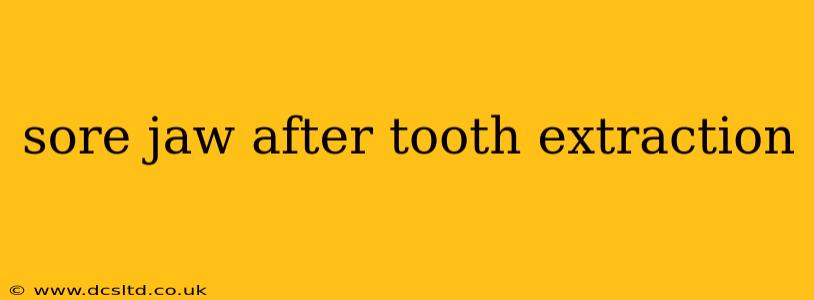Having a sore jaw after a tooth extraction is a common experience. While some discomfort is expected, persistent or severe pain warrants attention. This comprehensive guide explores the causes, treatment options, and preventive measures for jaw soreness following tooth extraction. We'll also address frequently asked questions to ensure you're well-informed and prepared for a smoother recovery.
What Causes Jaw Soreness After Tooth Extraction?
Jaw pain post-extraction stems primarily from the surgical trauma itself. The extraction process involves removing the tooth and potentially some surrounding bone and tissue. This disruption causes inflammation and swelling, leading to pain, stiffness, and tenderness in the jaw. The intensity of the pain varies depending on the complexity of the extraction, the individual's pain tolerance, and the presence of any pre-existing conditions. Furthermore, the healing process involves the formation of a blood clot in the extraction socket, and the body's natural response to this healing process can contribute to jaw stiffness and discomfort.
Why Does My Jaw Feel Stiff After Tooth Extraction?
Stiffness in the jaw after a tooth extraction is a direct result of the inflammation and swelling mentioned above. Your body's inflammatory response is crucial for healing, but this process also restricts muscle movement and can lead to a feeling of stiffness. This stiffness is often most noticeable in the initial days following the procedure, gradually subsiding as the inflammation reduces. The muscles surrounding the extraction site may also be sore due to the procedure itself and potentially from the necessary positioning during the extraction.
How Long Does Jaw Pain Last After Tooth Extraction?
The duration of jaw pain varies significantly from person to person. Generally, the most intense pain subsides within the first few days, typically improving within 3-7 days. However, some lingering soreness or discomfort can persist for several weeks as the extraction site heals completely. Factors influencing recovery time include the complexity of the extraction, the patient's overall health, and adherence to post-operative instructions. If the pain persists beyond a reasonable timeframe or worsens, seeking professional dental advice is crucial.
How Can I Reduce Jaw Pain After Tooth Extraction?
Managing post-extraction jaw pain involves several strategies:
- Medication: Your dentist will likely prescribe pain relievers such as ibuprofen or acetaminophen to manage discomfort. Strictly follow the prescribed dosage and duration.
- Ice Packs: Applying ice packs to the affected area for 15-20 minutes at a time, several times a day, can help reduce swelling and pain. Ensure a barrier (like a thin cloth) between the ice pack and your skin.
- Rest: Avoid strenuous activities and ensure adequate rest to allow your body to focus on healing.
- Soft Foods: Sticking to a diet of soft foods for the first few days minimizes stress on the extraction site and jaw muscles.
- Gentle Rinsing: Gently rinsing your mouth with saltwater can help keep the area clean and promote healing. Avoid vigorous rinsing or forceful spitting.
- Avoid Smoking and Alcohol: These substances can interfere with the healing process and increase the risk of complications.
What are the Signs of a Problem After Tooth Extraction?
While some discomfort is normal, certain signs indicate a potential complication and require immediate dental attention:
- Severe, persistent pain that doesn't respond to medication.
- Excessive bleeding or swelling that worsens over time.
- High fever or chills.
- Signs of infection, such as pus or redness around the extraction site.
- Numbness or tingling that persists beyond a few hours.
Can I Exercise After a Tooth Extraction?
Avoid strenuous exercise for at least the first few days after a tooth extraction. Intense physical activity can increase blood pressure and potentially disrupt the blood clot formation, leading to complications. Light activity is generally acceptable after the initial recovery period, but always listen to your body and avoid activities that cause pain or discomfort in your jaw. Consult your dentist before resuming any intense physical activities.
When Should I Call My Dentist After a Tooth Extraction?
Contact your dentist immediately if you experience any of the warning signs mentioned above. Don't hesitate to reach out even if you have concerns that aren't explicitly listed—it's always better to err on the side of caution when it comes to post-extraction care.
This information is for general knowledge and does not substitute professional medical advice. Always consult with your dentist for personalized recommendations and guidance related to your specific situation. Proper post-operative care is crucial for a smooth recovery and minimizing complications after a tooth extraction.
